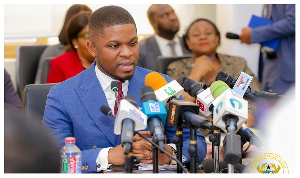Rockson-Nelson Etse K. Dafeamekpor (NDC-South Dayi), has questioned the basis of the incumbent NPP caucus in Parliament’s claim that they form the Majority.
The NPP in Parliament held a press conference Thursday during which Osei Kyei-Mensah-Bonsu, the NPP leader referenced the letter by Andrew Asiamah, the Independent MP who stated that he would sit with them as evidence that they are Majority Caucus and hence must sit at the right-hand side of the Speaker.
However, according to the South Dayi MP, if the interpretation of the decision of the Independent MP for Fomena to do business with the NPP caucus in Parliament is expressed as a numerical advantage for the NPP, then it implies that the Fomena MP is counting himself as a member of the NPP. This means that he loses his seat automatically under Article 97(1)(h) of the 1992 Constitution and therefore, he cannot hold himself as MP for Fomena.
“In this case, the overall implication remains that he cannot also hold himself as second deputy Speaker under Article 96(1)(b) stated supra,” Dafeamekpor explained in a five-page response issued January 14 to Afenyo Markin, the NPP’s deputy Majority leader.
Article 96 of the 1992 Constitution reads: "There shall be two Deputy Speakers of Parliament - (a) who shall be elected by the members of Parliament from among the members of Parliament; and (b) both of whom shall not be members of the same political party."
This, the MP argues, means that “at all material times, the Independent status of the 2nd Deputy Speaker is upheld if he should remain the 2nd Deputy Speaker, or he risks losing that position.”
Alexander Afenyo Markin and other NPP MPs are claiming Majority in Parliament through the formal letter by Andrew Amoako Asiamah to Rt. Hon. Alban Bagbin, the Speaker of Parliament, in which Asiamah expressed his intention to caucus with the NPP in Parliament.
In the aforementioned letter issued on January 13, Asiamah stated in parts:
“I shall, for purposes of transacting business in the house, associate with the NPP caucus in the Eighth Parliament. For the avoidance of doubt, I do hereby affirm that I shall co-operate and collaborate with the NPP caucus in the Eighth Parliament.”
The Independent MP’s decision, however, does little in helping the NPP settle the debate as to which of the two caucuses is the Majority party in Parliament since a caucus is different from a party.
Both the NPP and NDC have 137 MPs each and now that the only Independent MP has made this formal declaration, it will then increase the number of MPs for the NPP caucus by one above the NDC caucus, a crucial advantage when it comes doing parliamentary business unless there is a secret balloting process which could be anybody’s game.
Dafeamekpor further averred: “If that [claimed NPP Majority] determination is made pursuant to Order 7 of our Standing Orders, then it further means that the NPP will now appoint all the Chairmen and Vice-Chairmen of all the Committees in Parliament except those that the rules say are chaired by the Minority (such as Public Accounts, Subsidiary Legislation and Government Assurance) simply because they constitute the 'Majority'.
He went on: “The further effect is that the NDC, therefore, can only appoint Rankings and Deputy Rankings to these Committees. That's the reality of the effect of what the second deputy Speaker has done.”
Rockson-Nelson Etse K. Dafeamekpor argued further that the meaning of 'party' as used in the Standing Orders cannot be construed to include Independent Members of Parliament.
He stated: "Never. Not even by relying on any modern mechanisms of purposive interpretations. An independent member cannot be equated to a political party as used by the framers of the Standing Orders and ascribed with qualities and features of a political party.”
Dafeamekpor continued: “In the proper understanding, doing business with the NPP should mean ordinarily associating with [the] NPP on all fronts in proceedings in parliament. The choice made as a Member of Parliament will make him to vote or oppose motions on the side of NPP in Parliament.
“It does not make the Fomena MP an NPP member to create a membership advantage to the NPP in determining or making the NPP the majority side in Parliament.”
Read Rockson-Nelson Etse K. Dafeamekpor’s full legal argument below:
General News of Friday, 15 January 2021
Source: www.ghanaweb.com













